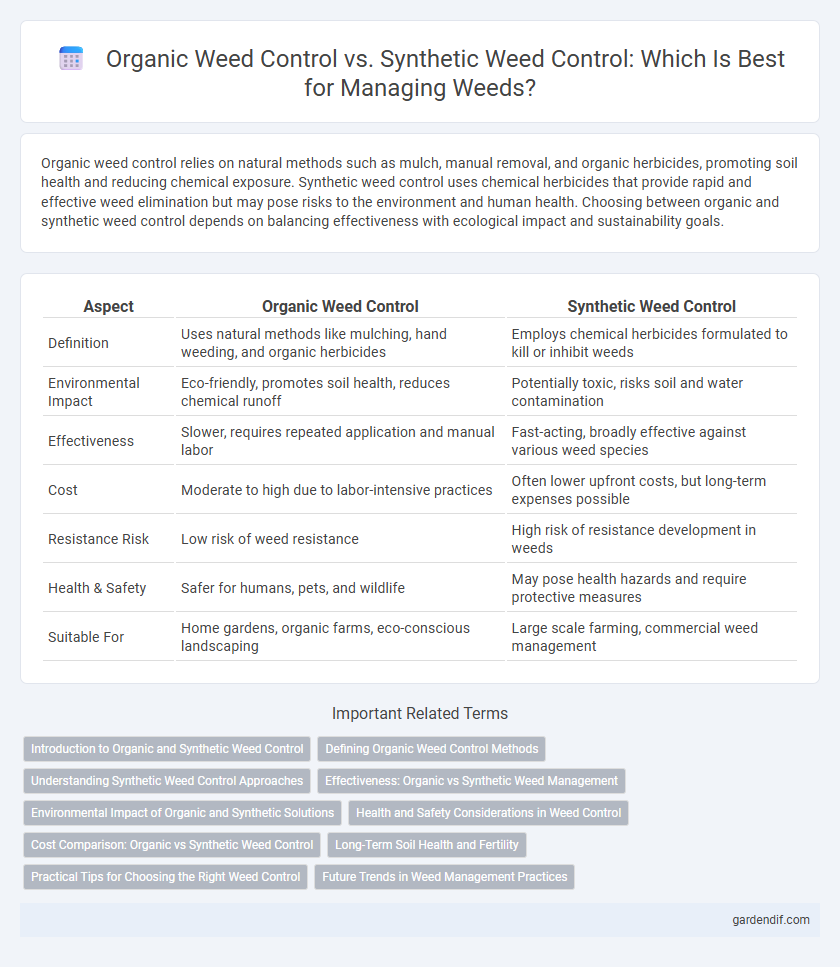
Organic weed control vs Synthetic weed control Illustration
Organic weed control relies on natural methods such as mulch, manual removal, and organic herbicides, promoting soil health and reducing chemical exposure. Synthetic weed control uses chemical herbicides that provide rapid and effective weed elimination but may pose risks to the environment and human health. Choosing between organic and synthetic weed control depends on balancing effectiveness with ecological impact and sustainability goals.
Table of Comparison
| Aspect | Organic Weed Control | Synthetic Weed Control |
|---|---|---|
| Definition | Uses natural methods like mulching, hand weeding, and organic herbicides | Employs chemical herbicides formulated to kill or inhibit weeds |
| Environmental Impact | Eco-friendly, promotes soil health, reduces chemical runoff | Potentially toxic, risks soil and water contamination |
| Effectiveness | Slower, requires repeated application and manual labor | Fast-acting, broadly effective against various weed species |
| Cost | Moderate to high due to labor-intensive practices | Often lower upfront costs, but long-term expenses possible |
| Resistance Risk | Low risk of weed resistance | High risk of resistance development in weeds |
| Health & Safety | Safer for humans, pets, and wildlife | May pose health hazards and require protective measures |
| Suitable For | Home gardens, organic farms, eco-conscious landscaping | Large scale farming, commercial weed management |
Introduction to Organic and Synthetic Weed Control
Organic weed control utilizes natural methods such as mulching, crop rotation, and the application of biological herbicides derived from plants or microbes to suppress weed growth. Synthetic weed control relies on chemical herbicides formulated to target specific weed species, offering rapid and broad-spectrum efficacy. Understanding the differences in environmental impact, residue persistence, and long-term soil health is essential when selecting between organic and synthetic weed management strategies.
Defining Organic Weed Control Methods
Organic weed control methods involve using natural processes and materials such as mulching, hand weeding, and the application of organic herbicides derived from plant-based compounds. These methods prioritize soil health, biodiversity, and environmental safety by avoiding synthetic chemicals and promoting sustainable agriculture. Techniques like crop rotation and the use of cover crops also enhance weed suppression while enriching soil fertility.
Understanding Synthetic Weed Control Approaches
Synthetic weed control approaches utilize chemical herbicides designed to target specific weed species while minimizing crop damage. These formulations often include pre-emergent and post-emergent herbicides, which inhibit weed seed germination or disrupt weed growth after emergence. Understanding the modes of action and environmental impact of synthetic herbicides is crucial for effective and responsible weed management in agricultural practices.
Effectiveness: Organic vs Synthetic Weed Management
Organic weed control relies on natural methods such as mulching, manual removal, and the use of bioherbicides, offering targeted effectiveness with minimal environmental impact but often requiring more labor and time. Synthetic weed control uses chemical herbicides that provide rapid and broad-spectrum weed suppression, ensuring higher immediate effectiveness but raising concerns about soil health and resistance development. Studies indicate that integrating organic practices with selective synthetic applications can optimize weed management by balancing efficacy and sustainability.
Environmental Impact of Organic and Synthetic Solutions
Organic weed control methods utilize natural substances like corn gluten meal and vinegar, minimizing soil and water contamination while promoting biodiversity. Synthetic weed control relies on chemical herbicides such as glyphosate, which can persist in the environment, potentially harming beneficial organisms and polluting groundwater. Studies show organic approaches reduce chemical runoff and ecological disruption, contributing to sustainable land management and healthier ecosystems.
Health and Safety Considerations in Weed Control
Organic weed control methods prioritize natural ingredients like vinegar, corn gluten meal, and manual removal, significantly reducing exposure to harmful chemicals and lowering environmental risks. Synthetic weed control often involves herbicides containing glyphosate or atrazine, which have been linked to health concerns such as respiratory issues, skin irritation, and potential carcinogenic effects. Emphasizing organic approaches in weed management minimizes health hazards to humans and animals while promoting sustainable agricultural and garden practices.
Cost Comparison: Organic vs Synthetic Weed Control
Organic weed control methods generally incur higher initial costs due to labor-intensive practices and expensive natural products, while synthetic weed control offers lower upfront expenses through mass-produced chemical herbicides. Over time, organic approaches may reduce costs by improving soil health and reducing chemical dependency, though synthetic methods often provide quicker, more affordable results for large-scale applications. Evaluating long-term financial impact involves balancing immediate affordability against sustainability and potential environmental remediation expenses linked to synthetic herbicides.
Long-Term Soil Health and Fertility
Organic weed control enhances long-term soil health and fertility by promoting beneficial microbial activity and improving soil structure through natural inputs like compost and mulch. Synthetic weed control often disrupts soil ecosystems by killing off essential microorganisms and leading to chemical buildup, which can degrade soil quality over time. Sustainable weed management favors organic methods to maintain nutrient cycling and soil resilience for future crop productivity.
Practical Tips for Choosing the Right Weed Control
Organic weed control methods utilize natural ingredients such as vinegar, corn gluten meal, or mulching to suppress weeds while preserving soil health and reducing chemical exposure. Synthetic weed control involves the application of chemical herbicides that offer fast, effective results but may impact beneficial organisms and soil quality over time. Practical tips for choosing the right weed control include assessing weed species, soil condition, environmental impact, and safety requirements to balance efficacy with sustainability.
Future Trends in Weed Management Practices
Future trends in weed management practices emphasize the increasing adoption of organic weed control methods driven by environmental sustainability and consumer demand for chemical-free products. Advances in biopesticides and natural herbicides enhance the effectiveness of organic solutions while reducing ecological impact compared to synthetic chemicals. Integration of precision agriculture technologies with organic weed control also optimizes resource use and promotes long-term soil health.
Organic weed control vs Synthetic weed control Infographic

 gardendif.com
gardendif.com